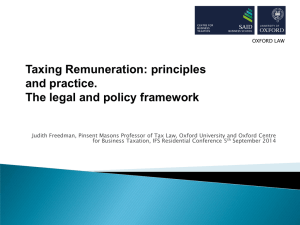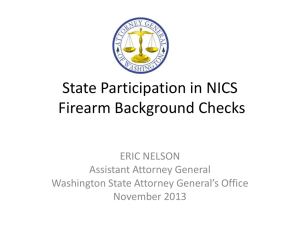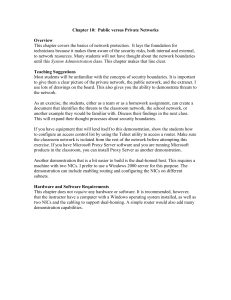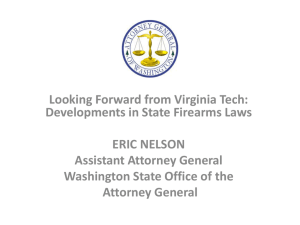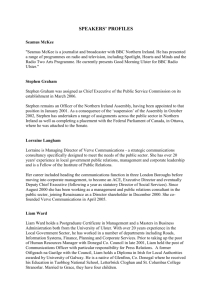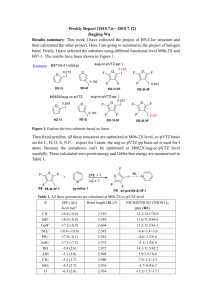March 14, 2000 The President The White House
advertisement
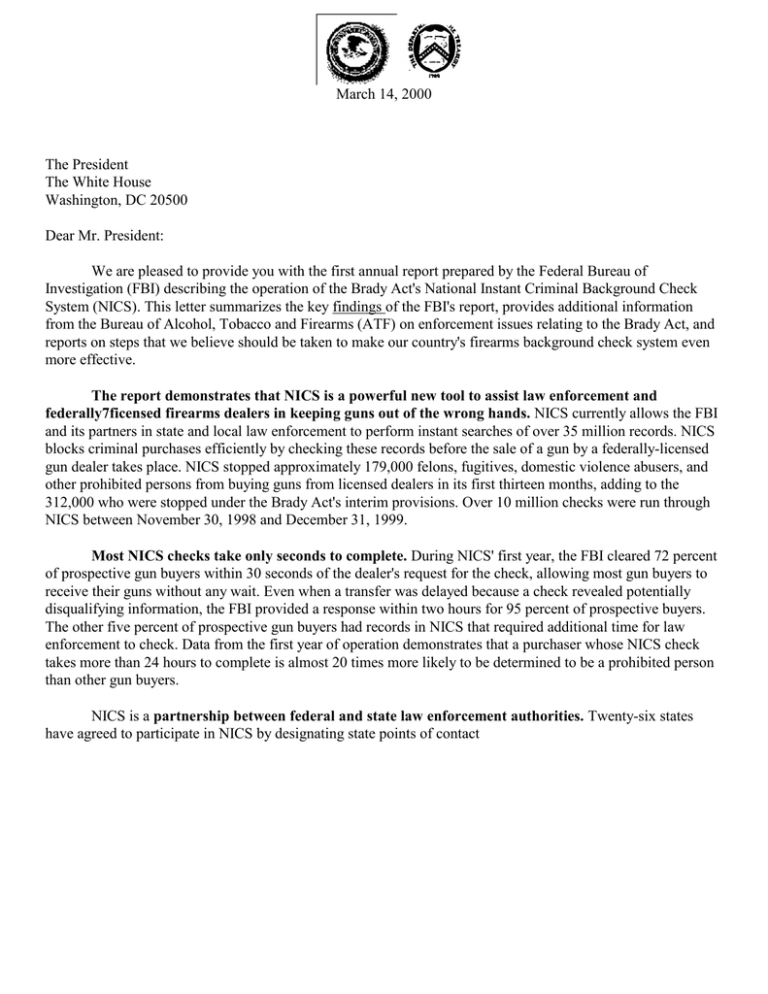
March 14, 2000 The President The White House Washington, DC 20500 Dear Mr. President: We are pleased to provide you with the first annual report prepared by the Federal Bureau of Investigation (FBI) describing the operation of the Brady Act's National Instant Criminal Background Check System (NICS). This letter summarizes the key findings of the FBI's report, provides additional information from the Bureau of Alcohol, Tobacco and Firearms (ATF) on enforcement issues relating to the Brady Act, and reports on steps that we believe should be taken to make our country's firearms background check system even more effective. The report demonstrates that NICS is a powerful new tool to assist law enforcement and federally7ficensed firearms dealers in keeping guns out of the wrong hands. NICS currently allows the FBI and its partners in state and local law enforcement to perform instant searches of over 35 million records. NICS blocks criminal purchases efficiently by checking these records before the sale of a gun by a federally-licensed gun dealer takes place. NICS stopped approximately 179,000 felons, fugitives, domestic violence abusers, and other prohibited persons from buying guns from licensed dealers in its first thirteen months, adding to the 312,000 who were stopped under the Brady Act's interim provisions. Over 10 million checks were run through NICS between November 30, 1998 and December 31, 1999. Most NICS checks take only seconds to complete. During NICS' first year, the FBI cleared 72 percent of prospective gun buyers within 30 seconds of the dealer's request for the check, allowing most gun buyers to receive their guns without any wait. Even when a transfer was delayed because a check revealed potentially disqualifying information, the FBI provided a response within two hours for 95 percent of prospective buyers. The other five percent of prospective gun buyers had records in NICS that required additional time for law enforcement to check. Data from the first year of operation demonstrates that a purchaser whose NICS check takes more than 24 hours to complete is almost 20 times more likely to be determined to be a prohibited person than other gun buyers. NICS is a partnership between federal and state law enforcement authorities. Twenty-six states have agreed to participate in NICS by designating state points of contact The President Page 2 (POCs) for some or all background checks. In POC states, state officials rather than the FBI perform background checks using NICS. State POCs strengthen the ' system, because they often can perform more thorough checks than the FBI. POCs are familiar with the state's own firearms laws and local crime problems, and the POCs have access to information in state databases that is not typically available to the FBI. Approximately one-half of the checks run through NICS in its first year were handled by the state POCs. In addition to fulfilling its primary purpose of stopping illegal gun purchases before they occur, NICS also assists law enforcement in apprehending fugitives and supports federal investigations and prosecutions of violent offenders. NICS not only prevented more than 2,400 fugitives from justice from purchasing firearms, but FBI employees conducting NICS checks were able to identify wanted persons to federal, state, and local law enforcement agencies. This contact resulted in the apprehension of a significant number of fugitives, including at least one prison escapee. NICS also transmits information about those denied gun purchases to ATF, and ATF has sent approximately 28,000 such reports concerning the most serious and violent offenders to its field offices. These included nearly 15,000 persons denied due to a domestic violence conviction or a restraining order for domestic violence. Information from NICS denials helps law enforcement target limited resources, and individuals referred based on NICS denials are subject to investigation for false statement and other criminal charges. The period of time that law enforcement officials are given to complete checks under NICS is a critical factor in NICSI effectiveness at keeping guns out of the wrong hands. On November 30, 1998, the maximum period of time that the Brady Act allows law enforcement to require a dealer to delay a sale so that additional records can be checked was reduced from five business days to three. In a relatively small but significant number of cases, the Brady Act's current three-business-day period is insufficient to stop the illegal acquisition of a gun from a licensed dealer. During the first year of NICS operation, 3,849 people determined by NICS to be prohibited were able to acquire guns from licensed dealers because the three-business-day window was inadequate to allow completion of the NICS check, and the dealer reported a transfer of the firearm notwithstanding the pendency of the check. ATF must investigate each of these cases to ensure the removal of firearms from the possession of prohibited persons, diverting law enforcement resources from other investigations and forcing investigators to face a potential danger that could be avoided if the three-business-day window were extended, as previously recommended by the Administration. We recommend that firearms dealers await completion of a NICS check before transferring a firearm. Allowing more time to complete checks would assist in preventing transfers to prohibited persons without any adverse impact on the vast majority of gun buyers, whose checks are completed within two hours. Conversely, reducing the time available for law enforcement to complete checks under NICS - as some have suggested - would pose significant public safety risks. Data from the first year of NICS operation reveal that if the period of time available to complete background checks had been 24 hours, instead of three business days, 33,992 of the prohibited persons that the FBI stopped using the NICS would have been able to buy guns. The President Page 3 Funding for the National Criminal History Improvement Program (NCHIP) should be enhanced to allow states to provide NICS with greater access to needed records. Since passage of the Brady Act, the Justice Department has awarded over $200 million in grants to states to update, computerize, and complete their criminal history records. This funding has helped significantly in making records available to NICS. Nonetheless, most delays in establishing a potential gun buyer's prohibited status occur when NICS determines that an arrest has been made, but the record is incomplete, so that the FBI must find out through state courts or local officials whether the arrest resulted in a disqualifying conviction. Moreover, the risks of violent acts by those with domestic violence convictions or subject to domestic violence restraining orders must not be underestimated. Additional NCHEP monies will enable states to make more criminal disposition information available in their records and enhance the availability of records revealing a domestic violence prohibition. States should be encouraged to participate in NICS. Because current law prohibits the FBI from charging a fee for the NICS checks that it performs, Congress has appropriated funds for the FBI to conduct checks. Congress, however, does not provide funds to POC states to defray their costs, effectively requiring them to charge their residents for a service that the FBI provides free of charge. In addition, when a background check reveals incomplete information, such as an arrest record without a disposition, the FBI or state POC must request the missing information from the state court or other state or local records system. To comply with this request, the states incur some expense for the benefit of public safety. Incentives should be developed to encourage states to participate as POCs and provide disposition information for Brady background checks. The FBI must be allowed to retain NICS records for a limited period of time to protect the privacy and security of NICS. The FBI retains records of approved transfers only for use in audits, including those performed by ATF during federal firearms dealer compliance inspections. Such inspections have identified instances of incomplete reporting and misuse of NICS, including the use of NICS for unauthorized purposes. If immediate destruction of NICS records were required, these abuses would go undetected and could be expected to increase. Extending the Brady Act's requirements to gun shows and flea markets should remain a priority. As you know, under current law, the protections of the Brady Act are only available for transfers by licensed gun dealers. Because the Brady Act only applies to the gun sales that are conducted by licensed dealers at gun shows, the gun show loophole still allows thousands of guns to change hands at gun shows and flea markets without any background check whatsoever. The President Page 4 The Departments of the Treasury and Justice, and the FBI and ATF, will continue to work together to keep guns out of the wrong hands. The Brady Act and NICS have proven to be very effective means to accomplish that goal, which would be significantly advanced by the recommendations set forth above. Respectfully, /s/ Lawrence H. Summers Secretary of the Treasury /s/ Janet Reno Attorney General
